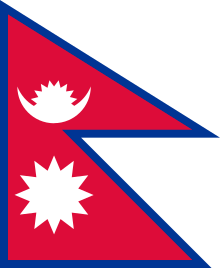Man Mohan Adhikari
| Manmohan Adhikari(Magi) | |
|---|---|
| मनमोहन अधिकारी | |
| 31st Prime Minister of Nepal | |
|
In office 30 November 1994 – 12 September 1995 | |
| Monarch | Birendra |
| Preceded by | Girija Prasad Koirala |
| Succeeded by | Sher Bahadur Deuba |
| Personal details | |
| Born |
9 June 1920[1] Lazimpat, Kathmandu |
| Died |
26 April 1999 (aged 78) Kathmandu, Nepal |
| Political party | Communist Party of Nepal (Unified Marxist-Leninist) |
| Relatives | Bharat Mohan Adhikari (brother) |
Communism in Nepal
 Leaders
Current groups
Defunct groups
Related articles
|
Man Mohan Adhikari(Magi) (Nepali: मन मोहन अधिकारी 9 June 1920 – 26 April 1999) was the 31st Prime Minister of Nepal from 1994 to 1995, representing the Communist Party of Nepal (Unified Marxist-Leninist). He was the first democratically elected Communist Party member to be Prime Minister in Nepal.
Family and Early Life
Born in Lazimpat, Kathmandu, Nepal, he spent his childhood in Biratnagar. His family was a landowner Brahmin family of Eastern Nepal.[2] He was sent to Varanasi to study in 1938. While studying for his B.Sc. in 1942, Adhikari took part in Quit India movement and he was arrested by the British colonial authorities and jailed along with other politicians.
Life
During his stay in India, Adhikari became involved in the communist movement, joining the Communist Party of India. He returned to Biratnagar and worked in chemical industry where, in March 1947, he took part in the Biratnagar jute mill strike and was arrested and taken to Kathmandu via land route along with Girija Prasad Koirala and Bishweshwar Prasad Koirala.[3]
He took part in the founding of the Communist Party of Nepal in 1949.
During the Bangladesh Liberation War, Adhikari asserted that the war was an Indian aggression against Pakistan.[4]
In November 1994, elections were held following a dissolution of parliament. Despite Congress securing a higher popular vote than the UML, the latter secured 88 seats to the former's 83. Neither party was successful in forming a coalition to hold a majority of the 205 seats. After failed coalition negotiations, however, Adhikari became Prime Minister of a minority government, acquiring the support of the National Democratic Party and the Sadbhavana Party.[5]
In June 1995, the National Democratic Party and the Sadbhavana Party (who helped the UML form a minority government in November 1994) supported the Nepali Congress's call for a vote of no-confidence in Adhikari's government in a special session of the House of Representatives. Adhikari attempted to dissolve parliament and call elections in an attempt to replicate the circumstances under which he assumed office in 1994. But a Supreme Court challenge led by Congress saw this move deemed unconstitutional and the parliament was restored. The vote of no-confidence proceeded successfully. Elections in 1995 saw Adhikari's government voted out of office.[6]
Adhikari was one of the few democratically elected communist party members in the world to serve as head of the government.
Health and death
Adhikari suffered from asthma for four decades and went to China for four years to seek treatment after contracting tuberculosis.[7]
On 19 April, he suffered a heart attack during an election rally in the village of Gothatar and fell into a coma. He was declared brain dead on 22 April with no hope of recovery. He died four days later. He was survived by his wife and two children.[8]
References
- ↑ "को हुन् स्व.मनमोहन अधिकारी ? सन्दर्भ : १७ औं मनमोहन अधिकारी स्मृति दिवस". Nepalpati (in Nepali). 24 April 2016. Retrieved 8 August 2017.
- ↑ Goldenberg, Suzanne (4 May 1999). "Man Mohan Adhikari". The Guardian. Retrieved 13 December 2017.
- ↑ Mahendra Man Singh (3 September 2013). Forever Incomplete: The Story of Nepal. SAGE Publications. pp. 124–. ISBN 978-81-321-1658-5.
- ↑ Parajulee, Ramjee P.. The Democratic Transition in Nepal. Rowman & Littlefield, 2000. p. 57
- ↑ Whelpton, John, A History of Nepal, Cambridge University Press, 2005, pp. 192-193.
- ↑ Whelpton, John, A History of Nepal, Cambridge Univerty Press, 2005, pp. 193-195.
- ↑ "The passing of a Communist veteran". Frontline. 16 (10). 8 May 1999. Retrieved 8 August 2017.
- ↑ "Manmohan Adhikari Dies". The Washington Post. 27 April 1999. Retrieved 8 August 2017.
| Political offices | ||
|---|---|---|
| Preceded by Girija Prasad Koirala |
Prime Minister of Nepal 1994 – 1995 |
Succeeded by Sher Bahadur Deuba |
